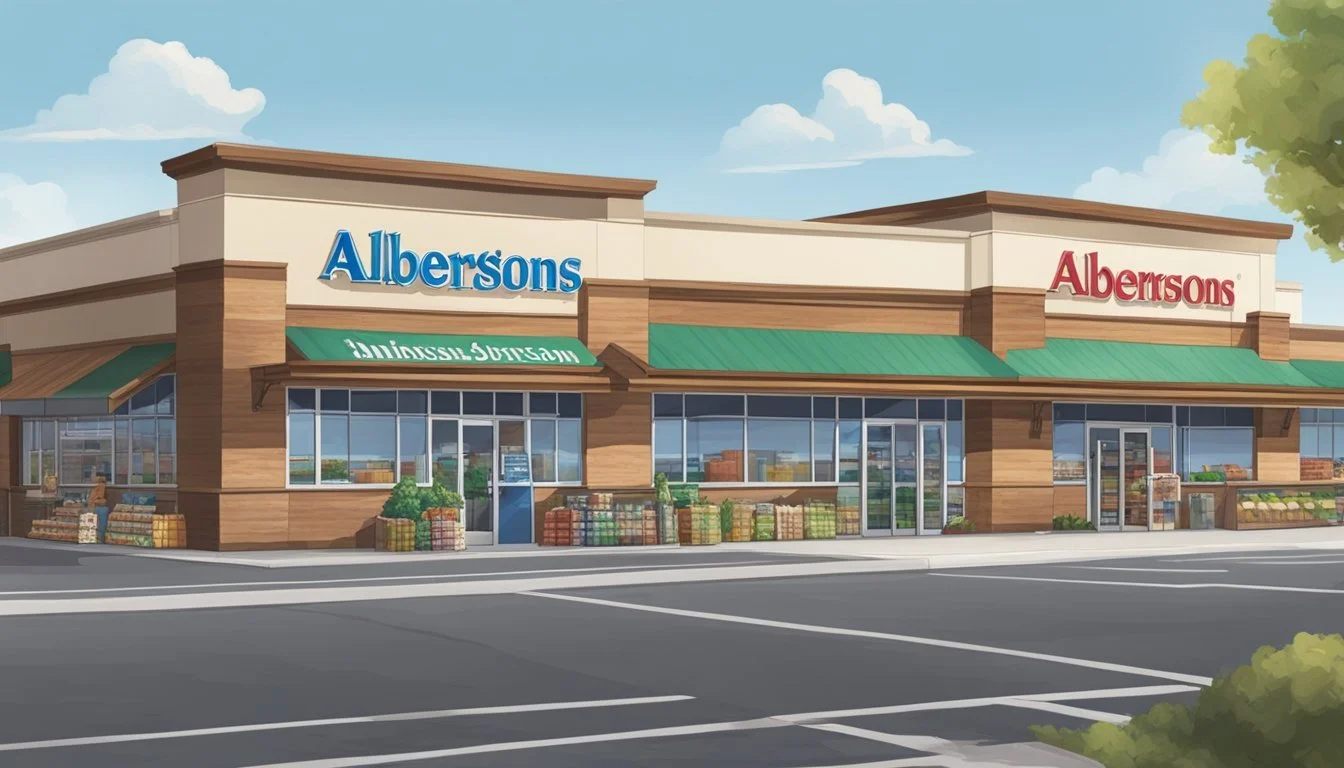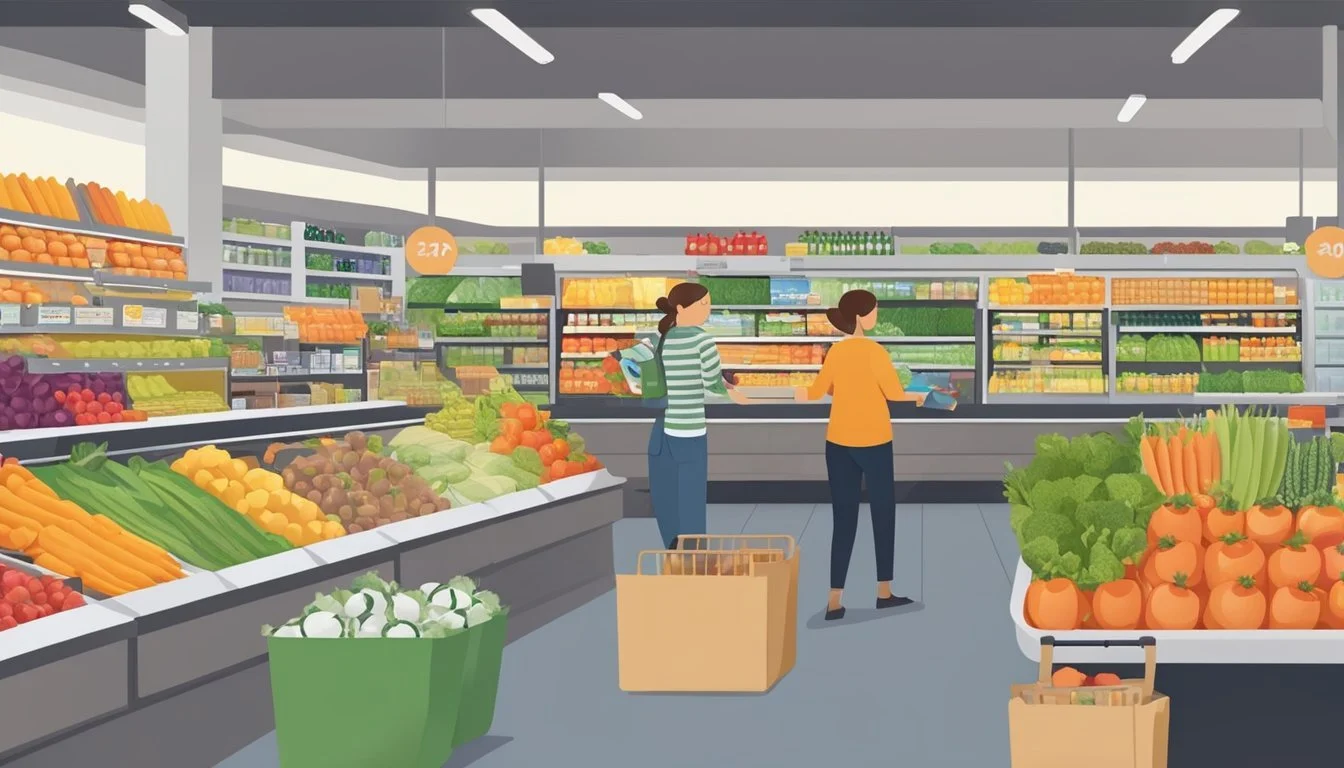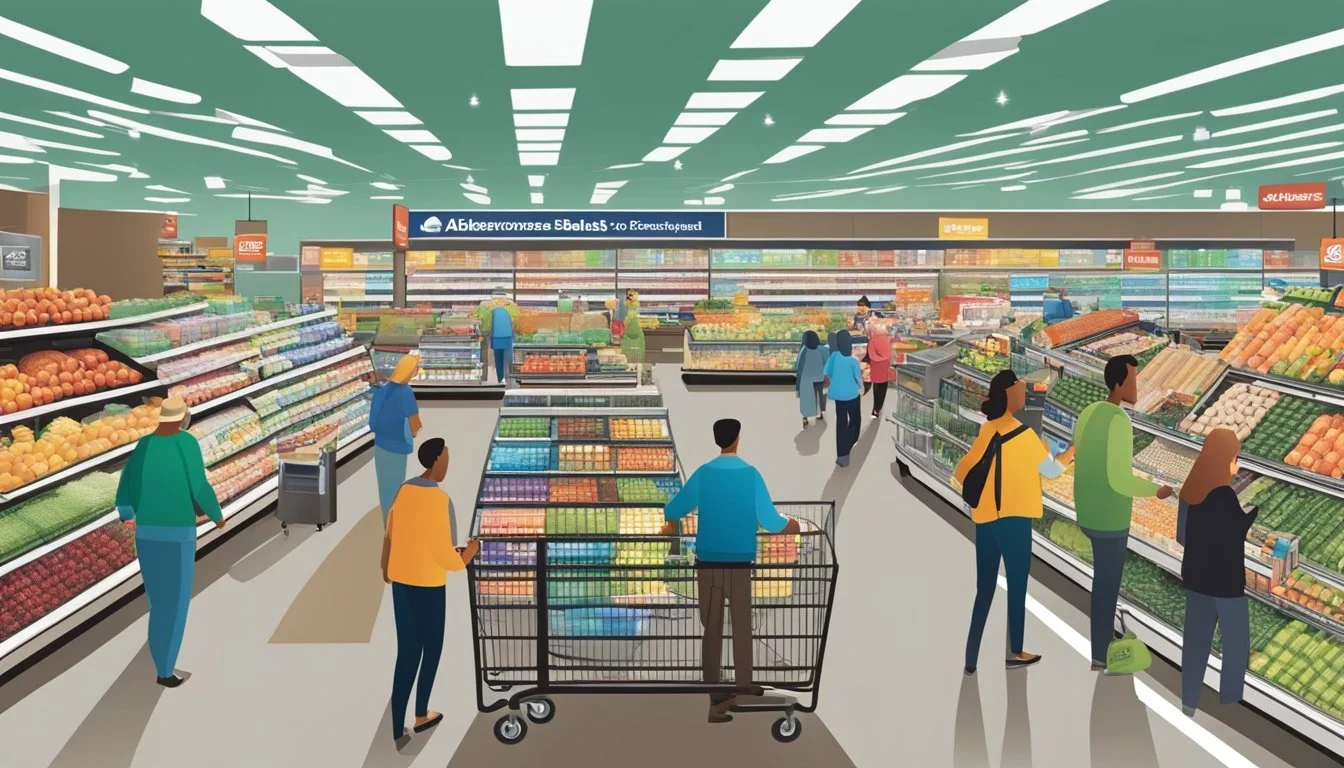Albertsons vs Demoulas Market Basket
A Comprehensive Comparison of Prices, Quality, and Selection
Albertsons and Demoulas Market Basket are two well-known grocery chains in the United States, each with its own unique approach to serving customers. While Albertsons operates on a national scale, Market Basket has built a loyal following in New England with its focus on affordability and quality.
Market Basket has gained recognition for its ability to combat inflation effectively. A 2022 study by consumer data firm Dunnhumby ranked Market Basket as the top grocery store for affordability and quality, outperforming over 60 other chains. This achievement highlights the company's commitment to providing value to its customers while maintaining high standards for its products.
Both Albertsons and Market Basket have rich histories and strong family ties. Albertsons has grown through mergers and acquisitions to become one of the largest grocery retailers in the country. Market Basket, on the other hand, has remained a family-owned business since its founding in 1917, preserving its old-fashioned values while adapting to modern customer needs.
Company Histories and Background
Albertsons and Demoulas Market Basket have distinct origins and growth trajectories that shaped their current positions in the grocery industry. Both companies started as small family businesses and expanded over decades to become significant players in their respective markets.
Albertsons: From Humble Beginnings to National Chain
Joe Albertson opened his first grocery store in Boise, Idaho in 1939. The store emphasized quality, value, and customer service. Despite launching during the Great Depression, Albertsons grew steadily. By 1964, it had expanded to 100 stores.
In the following decades, Albertsons continued its rapid growth through acquisitions and new store openings. Notable acquisitions included:
1999: American Stores Company
2013: New Albertsons Inc. from Supervalu
2015: Safeway Inc.
Today, Albertsons operates over 2,200 stores across 34 states and Washington D.C. It's the second-largest supermarket chain in North America.
Demoulas Market Basket: A New England Staple
Demoulas Market Basket traces its roots to 1917 when Greek immigrants Athanasios and Efrosini Demoulas opened a small grocery store in Lowell, Massachusetts. Their sons, George and Telemachus, took over in 1954 and expanded the business.
The chain grew steadily in New England, focusing on low prices and customer satisfaction. By the 1990s, Market Basket had become a regional powerhouse. However, family disputes over ownership led to a highly publicized conflict in 2014.
Despite the turmoil, Market Basket maintained strong customer loyalty. Today, it operates 88 stores across Massachusetts, New Hampshire, Maine, and Rhode Island. The company remains privately held and continues to emphasize its family business roots and community connections.
Leadership and Ownership Structures
Albertsons and Market Basket have distinct leadership and ownership models that have shaped their corporate cultures. Both companies have faced significant changes and challenges in recent years.
Albertsons' Executive Evolution and Ownership
Albertsons operates under a traditional corporate structure with a CEO and board of directors. The company went public in 2020 after being privately held for years. Cerberus Capital Management remains a major shareholder.
Albertsons has experienced several leadership changes. In 2023, Vivek Sankaran stepped down as CEO, with Sharon McCollam taking over as interim CEO. The company's ownership structure includes institutional investors and private equity firms.
Market Basket and the Demoulas Family Saga
Market Basket's leadership story is intertwined with the Demoulas family saga. The company has been family-owned since its founding in 1917. In 2014, a highly publicized legal battle erupted between cousins Arthur T. Demoulas and Arthur S. Demoulas for control of the company.
Arthur T. Demoulas, popular among employees, was ousted as CEO by the board in 2014. This led to unprecedented employee protests and customer boycotts. The conflict was resolved when Arthur T. and his allies purchased the company for $1.5 billion.
Market Basket's unique ownership structure and family dynamics have significantly influenced its corporate culture and business practices.
Finances and Growth Strategies
Albertsons and Market Basket employ distinct financial approaches and expansion strategies to compete in the grocery industry. Their contrasting methods impact profitability, market share, and long-term sustainability.
Albertsons: Financial Performance and Expansion
Albertsons, a publicly traded company, focuses on aggressive expansion and acquisitions. The retailer's stock performance fluctuates based on market conditions and financial results. In recent years, Albertsons has taken on significant debt to fund growth initiatives and acquisitions.
The company pays quarterly dividends to shareholders, aiming to balance returns with reinvestment. Albertsons' expansion strategy involves both organic growth and mergers, as evidenced by its proposed merger with Kroger.
Store remodels and digital investments form key parts of Albertsons' growth plan. The retailer allocates substantial capital to modernize existing locations and enhance its e-commerce capabilities.
Market Basket: Revenue and Investment Strategies
Market Basket, a privately held company, prioritizes financial stability and organic growth. The retailer maintains a debt-free status, allowing for greater flexibility in pricing and operations.
Instead of paying dividends, Market Basket reinvests profits into the business. This approach funds new store openings, renovations, and technology upgrades without relying on external financing.
Market Basket's profit-sharing plan is a cornerstone of its financial strategy. Employees receive a portion of company profits, fostering loyalty and aligning worker interests with the retailer's success.
The company's conservative expansion focuses on carefully selected locations within its existing geographic footprint. This measured approach helps maintain operational efficiency and strong community ties.
Store Operations and Customer Experience
Albertsons and Market Basket take distinct approaches to store operations and customer experience. Their strategies differ in layout, atmosphere, and service philosophies, shaping unique shopping environments for customers.
Comparing In-Store Atmosphere and Layout
Albertsons stores typically feature modern designs with wide aisles and clear signage. The layout emphasizes efficiency, with departments organized for easy navigation. Produce sections are often near the entrance, followed by bakery and deli areas.
Market Basket maintains a more traditional, no-frills atmosphere. Stores have a utilitarian layout with densely packed shelves. This approach keeps operating costs low, allowing for competitive pricing. The old-fashioned feel appeals to many loyal customers who appreciate the focus on value.
Both chains prioritize well-stocked shelves, but Market Basket is known for its abundance of products in every aisle. This can create a slightly cluttered appearance but ensures shoppers find what they need.
Customer Service Philosophies
Albertsons emphasizes personalized service, training cashiers and staff to engage with customers. They invest in technology to streamline checkout processes and offer self-service options for convenience.
Market Basket takes pride in its attentive, hands-on approach to customer service. Cashiers are known for their efficiency and friendliness. The company maintains high staffing levels, ensuring customers can always find assistance when needed.
Both chains value customer feedback, but Market Basket's management is particularly responsive to shoppers' concerns and suggestions. This direct communication fosters a strong sense of community and loyalty among Market Basket customers.
Pricing Strategies and Affordability
Pricing plays a crucial role in grocery shopping decisions. Albertsons and Market Basket employ different strategies to attract customers and offer value.
Albertsons: Pricing Versus Value
Albertsons focuses on a balanced approach to pricing and value. The chain offers a mix of national brands and private label products to cater to various customer preferences and budgets. Albertsons' loyalty program provides personalized deals and discounts to regular shoppers.
The company uses dynamic pricing strategies, adjusting prices based on factors like competition and demand. This can result in occasional higher prices compared to some competitors. However, Albertsons aims to offset this with quality products and a pleasant shopping experience.
Albertsons has implemented initiatives to address affordability concerns during periods of high inflation. These include expanding their private label offerings and increasing promotional activities.
Market Basket's Approach to Low Prices
Market Basket has gained a reputation for consistently low prices. The chain prioritizes everyday low pricing over frequent sales or promotional events. This strategy aims to provide customers with reliable savings on each shopping trip.
Market Basket's pricing approach has proven effective in combating inflation. In a 2022 study by Dunnhuby, Market Basket ranked as the top grocery chain for affordability among over 60 competitors.
The company's prices are estimated to be about 18% lower than the industry average. For a family spending $250 weekly on groceries, this difference could translate to over $2,300 in annual savings.
Market Basket achieves these low prices through efficient operations and a no-frills shopping environment. The chain focuses on passing savings directly to customers, prioritizing affordability over fancy store layouts or extensive amenities.
Market Position and Competitiveness
Albertsons and Demoulas Market Basket occupy distinct positions in the competitive grocery landscape. Their market shares and strategies differ across regions, influencing their overall competitiveness against major players like Walmart, Aldi, and Whole Foods.
A Comparison of Market Baskets in Different Regions
Market Basket dominates in certain New England areas. It holds the top market share in Boston, Manchester, and Concord metro regions. The chain's success stems from its focus on low prices and customer loyalty.
Albertsons has a wider national presence but faces stiffer competition. Its market position varies by location, with stronger footholds in western states. The company competes through diverse store formats and an extensive product range.
Both chains adapt their offerings to regional preferences. Market Basket excels in local product selection, while Albertsons leverages its size for broader variety.
Competitive Analysis in the Grocery Industry
Albertsons ranks among the largest U.S. grocery chains, competing directly with Kroger and Walmart. Its proposed merger with Kroger aims to boost competitiveness against these giants and emerging players like Amazon-owned Whole Foods.
Market Basket, though smaller, punches above its weight in affordability. A 2022 study by Dunnhuby ranked it as the top grocery store for handling inflation, considering factors like price and quality.
Both face pressure from discount chains like Aldi and online grocery services. Albertsons responds with omnichannel strategies, while Market Basket relies on its core strengths of low prices and customer service to retain shoppers.
Loyalty and Community Engagement
Grocery chains cultivate customer loyalty and community connections through various initiatives. Both Albertsons and Market Basket have unique approaches to fostering strong relationships with shoppers and employees.
Albertsons' Loyalty Programs and Community Impact
Albertsons operates a digital loyalty program called Just for U. This app-based system offers personalized deals and rewards to frequent shoppers. Members earn points on purchases that can be redeemed for discounts or free products.
The company also engages in community outreach through its Albertsons Companies Foundation. This charitable arm supports local food banks, education initiatives, and health programs in areas where Albertsons operates stores.
Albertsons encourages employee volunteerism and matches donations made by team members to qualifying nonprofits. These efforts aim to strengthen ties with local communities and build goodwill among customers.
Market Basket: Worker Loyalty and Customer Commitment
Market Basket is renowned for inspiring exceptional loyalty from both workers and customers. This was dramatically demonstrated during a 2014 employee strike and customer boycott in support of ousted CEO Arthur T. Demoulas.
The company fosters worker loyalty through above-average wages, profit-sharing, and internal promotion opportunities. Many employees have decades-long tenures with the chain.
Market Basket cultivates customer loyalty through consistently low prices rather than a formal rewards program. The chain's "More For Your Dollar" slogan reflects its commitment to value.
During the 2014 protests, customers actively supported workers by boycotting stores. This unprecedented display of loyalty helped reinstate Arthur T. Demoulas as CEO.
Technology and Innovation
Albertsons and Demoulas Market Basket have distinct approaches to integrating technology into their grocery operations. These strategies shape their customer experiences and operational efficiency in the digital age.
Embracing Innovation in Grocery Shopping
Albertsons has invested heavily in modernizing its stores. The company introduced self-checkout kiosks and mobile payment options to streamline the purchasing process. They've also implemented digital shelf labels for real-time price updates.
Market Basket, in contrast, maintains a more traditional approach. The chain focuses on in-store experiences, relying less on technological advancements. This strategy aligns with their core customer base, who often prefer familiar shopping methods.
Both chains use inventory management systems to track stock levels and reduce waste. Albertsons employs predictive analytics to anticipate changing tastes and adjust product offerings accordingly.
Digital Strategy: Online Presence and E-commerce
Albertsons has a robust online presence with a user-friendly official website and mobile app. Customers can create shopping lists, access digital coupons, and place orders for pickup or delivery.
The company partnered with Instacart to expand its e-commerce capabilities, competing with Amazon's grocery services.
Market Basket's digital strategy is more limited. Their website provides basic information but lacks advanced features. The chain does not offer comprehensive online shopping options, focusing instead on in-store sales.
This approach may appeal to customers who prefer traditional shopping experiences but could limit Market Basket's ability to attract tech-savvy consumers.
Product Selection and Supplier Relations
Albertsons and Demoulas Market Basket differ significantly in their product offerings and supplier relationships. These factors play a crucial role in shaping the shopping experience and value proposition for customers.
Assortment of Goods and Supplier Networks
Albertsons boasts a wide range of products, including national brands and private label items. The company leverages its size to negotiate with large suppliers, offering a diverse selection across multiple categories.
Market Basket, in contrast, focuses on a more curated assortment. They prioritize local and regional suppliers, fostering strong relationships with smaller producers. This approach often results in unique products not found in larger chains.
Both stores carry staple grocery items, but Market Basket is known for its competitive pricing on everyday essentials. Albertsons tends to offer more specialty and gourmet options, catering to a broader range of culinary preferences.
Organic and Fresh Produce Options
Albertsons has expanded its organic and natural food offerings in recent years. The company partners with both large-scale organic suppliers and local farms to provide a variety of fresh produce options.
Market Basket takes pride in its fresh produce department, emphasizing locally sourced fruits and vegetables when possible. Their commitment to regional suppliers often translates to fresher products and shorter supply chains.
Both chains offer organic options, but Albertsons typically has a more extensive selection of certified organic items across different departments. Market Basket focuses on providing high-quality conventional produce at competitive prices, with a growing organic selection.
Health, Safety, and Environmental Considerations
Albertsons and Demoulas Market Basket prioritize customer and employee wellbeing while striving to minimize their environmental impact. Both chains have implemented various measures to ensure food safety, promote health, and adopt sustainable practices.
Implementing Safety Standards and Sustainable Practices
Albertsons maintains rigorous food safety protocols in its stores, emphasizing proper handling of fresh produce and perishables. The company has invested in advanced refrigeration systems to maintain optimal temperatures for dairy and meat products.
Market Basket focuses on sourcing local, high-quality fresh produce to reduce transportation emissions and support regional farmers. The chain has implemented energy-efficient lighting and refrigeration in its brick-and-mortar locations.
Both retailers offer a wide selection of organic and natural products to cater to health-conscious consumers. They have also expanded their plant-based options to promote sustainable eating habits.
Albertsons partners with healthcare providers to offer in-store pharmacies and vaccination services. Market Basket emphasizes employee training on food safety and hygiene practices.
To reduce waste, both chains have initiated recycling programs and donate unsold, edible food to local food banks. They have also taken steps to minimize single-use plastic packaging in their stores.











